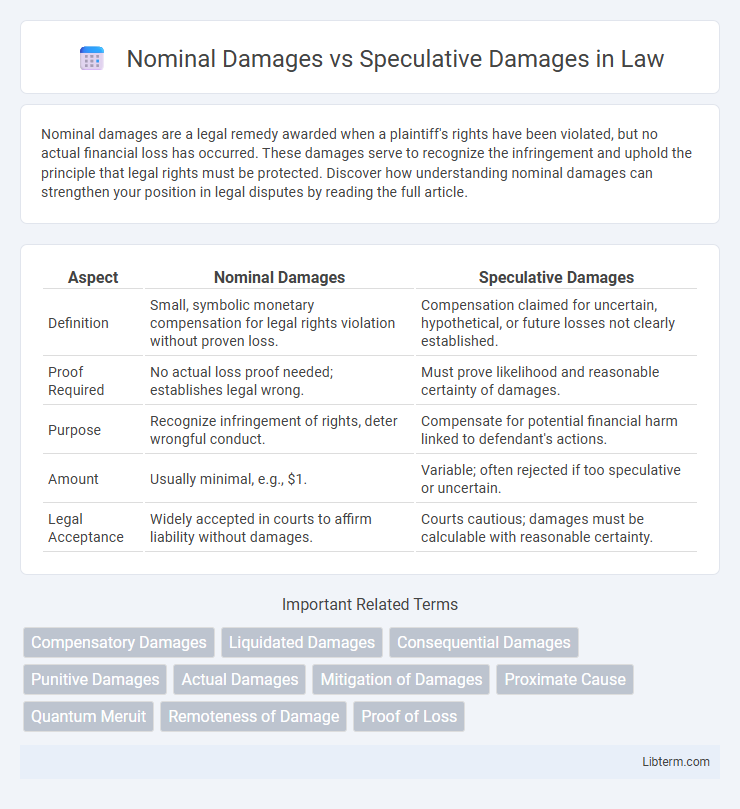Nominal damages are a legal remedy awarded when a plaintiff's rights have been violated, but no actual financial loss has occurred. These damages serve to recognize the infringement and uphold the principle that legal rights must be protected. Discover how understanding nominal damages can strengthen your position in legal disputes by reading the full article.
Table of Comparison
| Aspect | Nominal Damages | Speculative Damages |
|---|---|---|
| Definition | Small, symbolic monetary compensation for legal rights violation without proven loss. | Compensation claimed for uncertain, hypothetical, or future losses not clearly established. |
| Proof Required | No actual loss proof needed; establishes legal wrong. | Must prove likelihood and reasonable certainty of damages. |
| Purpose | Recognize infringement of rights, deter wrongful conduct. | Compensate for potential financial harm linked to defendant's actions. |
| Amount | Usually minimal, e.g., $1. | Variable; often rejected if too speculative or uncertain. |
| Legal Acceptance | Widely accepted in courts to affirm liability without damages. | Courts cautious; damages must be calculable with reasonable certainty. |
Understanding Nominal Damages
Nominal damages represent a small monetary award granted when a legal wrong is proven, but no actual financial loss has occurred, serving to acknowledge the violation of rights. Unlike speculative damages, which involve uncertain or hypothetical future losses, nominal damages provide a concrete legal recognition without requiring proof of substantial harm. Courts use nominal damages to affirm a plaintiff's rights while avoiding the complexities of quantifying intangible or unproven damages.
What Are Speculative Damages?
Speculative damages refer to compensation sought for losses that are uncertain or not concretely established at the time of the legal claim, often relying on predictions about future events. Unlike nominal damages, which are awarded when a legal wrong is proven but no substantial harm occurred, speculative damages involve estimating potential financial harm that may or may not materialize. Courts typically require clear evidence and reasonable certainty before awarding speculative damages to avoid compensating for mere possibilities or conjectures.
Key Differences Between Nominal and Speculative Damages
Nominal damages are a small, symbolic monetary award granted when a legal wrong is proven but no actual financial loss occurred, serving primarily to recognize the infringement of rights. Speculative damages, in contrast, involve potential or uncertain losses that cannot be quantified with reasonable certainty and are generally not recoverable due to their conjectural nature. The key difference lies in the certainty and proof of loss: nominal damages acknowledge a violation without measurable harm, while speculative damages attempt to compensate for hypothetical future losses lacking concrete evidence.
Legal Purpose of Nominal Damages
Nominal damages serve the legal purpose of recognizing a breach of duty or violation of rights when no actual harm or financial loss has occurred. They establish a legal precedent affirming the plaintiff's entitlement to redress despite the absence of measurable damages. Unlike speculative damages, which involve uncertain or hypothetical future losses, nominal damages provide a clear, symbolic acknowledgment of wrongdoing.
The Nature of Speculative Damages in Law
Speculative damages in law refer to compensation claimed for losses that are uncertain or not concretely proven, often hinging on conjecture rather than factual evidence. Courts require clear evidence to establish that such damages are a probable result of the defendant's actions, distinguishing them from nominal damages, which recognize a legal wrong without substantial loss. The inherently uncertain nature of speculative damages makes them difficult to quantify and often results in their denial unless backed by reliable and objective proof.
Cases Commonly Awarding Nominal Damages
Nominal damages are commonly awarded in breach of contract or trespass cases where actual harm is minimal or unproven, serving to acknowledge a legal wrong without substantial financial loss. Courts frequently grant nominal damages to uphold legal rights and establish liability, even when speculative damages lack sufficient evidence. This distinction emphasizes the judicial recognition of a violation despite the absence of quantifiable economic impact.
Why Courts Reject Speculative Damages
Courts reject speculative damages because they lack sufficient evidence to establish a concrete link between the defendant's actions and the claimed losses, making recovery uncertain and potentially unfair. Nominal damages are awarded when a legal wrong is proven but no actual financial loss can be quantified. This distinction ensures that courts compensate only tangible, provable harm, preserving judicial efficiency and fairness in damage awards.
Proof Requirements for Each Damages Type
Nominal damages require proof of a legal wrong without the need to show actual financial loss, serving primarily to acknowledge a breach or violation of rights. Speculative damages demand a higher standard of evidence, requiring concrete and reliable proof that the damages claimed are probable and can be quantified with reasonable certainty. Courts typically reject speculative damages absent clear, factual support, emphasizing the necessity for well-substantiated claims to prevent undue award based on conjecture or hypothesis.
Impact of Damage Type on Legal Outcomes
Nominal damages recognize a legal wrong when no substantial harm is proven, often leading to a symbolic judgment that upholds a party's rights without financial compensation. Speculative damages involve uncertain or unproven losses, making courts reluctant to award them due to the difficulty in quantifying actual harm, which can significantly reduce the chances of obtaining compensation. The distinction between these damage types influences legal outcomes by determining the feasibility of monetary recovery and shaping litigation strategies based on the evidence of harm presented.
Practical Examples: Nominal vs. Speculative Damages
Nominal damages are awarded when a legal wrong has occurred, but the plaintiff cannot prove substantial harm, such as a copyright infringement case where no financial loss is demonstrated. Speculative damages involve compensation for potential future losses that are uncertain, like lost profits from a business contract that never materialized due to breach. Courts typically grant nominal damages to acknowledge a violation, while speculative damages require concrete evidence to establish a probable and quantifiable financial impact.
Nominal Damages Infographic

 libterm.com
libterm.com